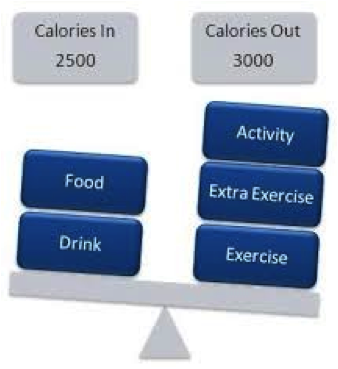
MUSCLE QUALITY AND FAT LOSS
Welcome to our Muscle Quality series. Be sure to check out the other articles in this series: Muscle Quality: Improving It Will Change Your Life, Muscle Quality and the Neurological System: Part 1, and Muscle Quality and the Neurological System: Part 2

Arguably, the most complex issue we deal with at The Exercise Coach® centers around fat loss. Weight gain, obesity, and type II diabetes,have been a growing issue in our country for the last 30 years. What are the most common solutions people have been told to fight the “Battle of the Bulge?” Eat less, move more, and have better will power! I’m sure you’ve heard that too.
People typically view exercise as a means to lose weight. When most people think of losing weight – they immediately think, “I need to work out more.” While the end result of weight loss may occur, in most cases, it is not for the reason most think.
ALL CALORIES ARE NOT CREATED EQUAL
The majority of health professionals would have you believe fat loss is centered around caloric deprivation. Something like this for example:

In this example, with a 500 calorie deficit per day, one could accumulate a 3500 calorie deficit for the week, leading to 1 pound of fat loss. (1 lb. = 3,500 calories). Unfortunately, it’s not that simple.
Many health professionals fail to take into account that all calories are not created equal. Fact: calories from sugary drinks, cookies, twinkies, etc. are most certainly not equal in quality and effect to the calories of meat and vegetables.
MUSCLE QUALITY DRIVES FAT LOSS
Most importantly, however, is the fact that it is muscle quality, more than anything else, that drives fat loss. It is the execution and performance of the workout which drives the physiological response to create a fat-burning inferno in muscle.
So to best understand this fat loss process, it is crucial we understand how body fat actually accumulates. It does so based on the different macronutrients we eat (protein, carbs, fat). As we eat these various macronutrients, they are digested, and trigger various physiological and hormonal responses. This is a big part of the fat loss equation. When we eat foods,specifically carbohydrates,they are digested, and metabolized into glucose (i.e. sugar). Once the glucose enters your blood stream, it triggers a storage hormone called insulin. Dietary fat actually doesn’t trigger an insulin response in the body, and, there are several other positive physiological responses before insulin kicks in when we eat protein. This makes it extremely difficult, if not impossible, to add body fat as a result of eating protein and dietary fat.
Insulin’s role in glucose metabolism is to help shuttle the sugar out of the bloodstream, and into cells, to be converted to glycogen and used as energy.
When we eat adequate amounts of carbohydrates, our glucose metabolism maintains a certain level of homeostasis where glucose and insulin do not stack up in our bloodstream. Excess glucose (from too many carbohydrates) that cannot be stored in our muscles is sent into the liver, converted into tryglycerides, and then is stored as fat. Thus, it is an excess of carbohydrates, and their conversion into glucose, that cause the fat storage process to initiate.
As a society, we have been told to, and indeed do, consume vast amounts of refined carbohydrates. However, lean body tissue can only store between 200-220 grams of glycogen at any one time with an additional 70 grams or so in the liver. This process is crucial to understand from an exercise point of view.
As we contract and fatigue our muscles, the energy we use is supplied by the stored form of glucose in our muscles, glycogen. One of the primary goals your Exercise Coach helps you achieve during your personal training session, is to deplete as much stored glycogen as possible. Some of the byproducts of fatigue, i.e. the lactic acid accumulation you feel as “muscle burn,” is a great indication that this is occurring. The inability to generate much force by the end of your exercise set is another indicator that you are depleting stored glycogen. This begins the cascade of fat burning effects within our body.
So how does muscle quality turn the fat-burning inferno on?
First, muscle fatigue depletes our energy (the glycogen). Then, your muscles search for a way to replenish their lost energy. If there is no excess glucose readily available, your body will call upon its reserves – your stored fat. This gives us the immediate benefit of creating a need for energy. When none is readily available, we put ourselves in position to start losing fat.
Another benefit of Right IntensityTM Exercise at The Exercise Coach® has to do specifically with the action of insulin. As stated above, insulin is working to help coerce the blood sugar into the muscles to be used. But, because of years of overconsumption of carbohydrates, the insulin receptors attached to the muscle cells begin to wear out. As they wear out under the constant bombardment of glucose, they no longer are able to function, and this is what happens to Type II diabetics. The good news, however, is The Exercise Coach® program has been proven to improve insulin sensitivity itself.
SUMMARY
So we have discussed the effect of glycogen depletion immediately after exercise as crucial to reducing fat, as well as the improvement of insulin receptors in the muscle cells, and we are just getting started!
If you recall, we previously discussed how the initial change in the body is neurological, which allows for the recruitment of more motor (muscle) units. This gives us more functioning musculature. As our lean muscle mass increases, it allows for greater glycogen depletion, which then creates a greater need to call on our stored fat. Each time, through the exercise/recovery period, we multiply the immediate and longer-term opportunities to burn stored fat.
ALL EXERCISE IS NOT CREATED EQUAL
Here again is why The Exercise Coach® program is so potent and effective. Last week we referred to the Law of Muscle Fiber Recruitment and we know it takes high-effort exercise, and Right IntensityTM training to recruit the biggest and most powerful muscle fibers on our body. Well, this is also where the greatest amount of glycogen is stored. Furthermore, if you aren’t exercising like we recommend, high amounts of a fat-promoting substance called triacylglycerol forms and this process will not be reversed.*
THE COUP DE GRAC
Perhaps the greatest aspect to our entire exercise program is that only two workouts a week are needed. The reason for this relates directly to fat loss. Glycogen depletion is a crucial element in starting the fat loss process. In The Exercise Coach® program, we are creating a need for stored energy to be used, we improve insulin sensitivity, we recruit and fatigue our fast twitch (read: larger) muscle fibers to multiply the effect, but, even better, we create an “after burn” effect (it’s more technical term is Exercise Post Oxygen Consumption, EPOC).
While we still hear that fat loss is a goal of many of our clients, it pales in comparison to the number of times we hear, “No way, that’s not possible,” when we tell people we only need them to work out for 20 minutes, twice a week. But it’s the truth! And the fat loss process is the major reason why.
As we discussed, glycogen depletion is a crucial element in the fat loss process. To deplete the most glycogen, we must fatigue our biggest, most powerful muscle fibers, the fast twitch or type II fibers. Doing this activates hormone-sensitive lipase which allows body fat to leave. Those bigger muscle fibers also require more time to recover. As they recover, they are also metabolically active calling for prolonged nourishment, insulin sensitivity stays high, and then fat burning continues to occur for anywhere from 2-7days.
What’s more, the Right Intensity TrainingTM, can, and should, be brief. Prolonging workouts will only affect the effort with no additional benefit to muscle development and fat loss, and may even become counterproductive.
Ahh fat loss! If it were only as easy as calories in – calories out. Health and exercise professionals have struggled through the years telling and blaming people that the reason they are overweight is because they eat too much, don’t exercise enough, or don’t have enough willpower. My response: garbage in / garbage out – both literally and figuratively. There are so many factors in play for fat, hormonal, and genetic factors, as well as nutrition, and exercise. For years, we at The Exercise Coach® have touted our simple solution to the fat loss problem: Whole Food Nutrition + Whole Effort Exercise = A Whole New You. On second thought, I guess fat loss is pretty simple after all.

Read the rest of this series:
Muscle Quality: Improving It Will Change Your Life
Muscle Quality and the Neurological System: Part 1
Muscle Quality and the Neurological System: Part 2
Muscle Quality and Cardiovascular Health
The Downside to prolonged “Cardio”
Muscle Quality and Osteoporosis
How to Combat Osteoporosis through Strength Training
Muscle Quality and Gastrointestinal Health
Muscle Quality and Inflammation
Muscle Quality and Brain Health
Muscle Quality and The Endocrine System: Part 1
Muscle Quality and The Endocrine System: Part 2
* Body By Science, Dr. Doug McGuff pg 103. See also.